Affairs: Diplomacy / Bangkok
Changing the conversation
Throughout its turbulent domestic history, Thailand’s default approach to global diplomacy has been to try to please all parties. But as geopolitical schisms widen, will this intermittent democracy with growing regional clout continue to conciliate – or is it time to take sides? Monocle meets the diplomats who will decide.

Inside the Ministry of Foreign Affairs (mfa) in Bangkok, Thailand’s top diplomats are gathered in the grand ceremonial hall, known as Vithes Samosorn, to discuss a forthcoming multilateral summit. Chair of the meeting, foreign minister Maris Sangiampongsa, begins by setting out the government’s top objectives to the agencies in attendance, including national intelligence, aviation, police and City Hall. Uniformed officers from each of the armed forces sit together on the U-shaped table. “We want to put Thailand back on the world radar,” says Sangiampongsa, a 66-year-old career diplomat-turned-politician who joined the cabinet in May. “Every agency has a big role to play in that mission.”
The Bay of Bengal Initiative for Multi-Sectoral Technical and Economic Co-operation (bimstec) is one of the more esoteric acronyms on the international relations calendar. India’s membership gives the club of mainly south Asian countries economic heft and its prime minister, Narendra Modi, is expected in Bangkok on 4 September. For the hosts, welcoming an in-demand foreign statesmen to the Thai capital provides a rare opportunity for positive international coverage – as long as the myriad protocols, tricky logistics and media messaging all run smoothly.
Thai diplomats are trained on how to greet visiting dignitaries (even how to kiss) but no amount of classroom teaching can prepare for the real thing and there are plenty of potential pitfalls, from the Bangkok traffic to the arrival of unwanted guests. Vital as bilateral relations are with Myanmar, a neighbour and fellow bimstec member state, the reprehensible military junta clinging on to power in Naypyidaw is a constant thorn in Thailand’s side at a time when Bangkok is trying to move beyond its own coup d’état. Elections last year ushered in the first civilian-led government since the Thai military seized power in 2014. The resulting coalition, an unlikely patchwork, has turned a page on what some foreign-policy veterans have called a “lost decade” for Thai diplomacy; former ambassadors posted to London and Washington under the military government talk about prioritising the mending of ties rather than advancing national interests. With democracy back in the ascendancy, for the time being at least, Thailand is standing taller on the world stage and eager to contribute.
At last year’s UN General Assembly, Thailand’s 30th prime minister, Srettha Thavisin, used his maiden speech to recommit to “proactive” diplomacy. His public riposte to widespread criticism of Thailand’s passive diplomacy under the generals was also a rallying cry for a country anxiously watching Vietnam’s rise on all fronts. The opportunity to make a positive contribution has brought renewed purpose to a downtrodden mfa along with some fresh faces at both the top and bottom of the organisation. A record number of new diplomats joined the service this year, bringing a much-needed injection of youthful energy, progressive views and internationalism.
The return of a peace-loving nation that wants to be friends with everyone comes at a critical time. The contest between the US and China is already dominating this century and the potential flashpoints continue to multiply. As the two superpowers cajole smaller nations to choose sides, the number of honest brokers is remarkably small. The likes of India and Vietnam are well positioned to profit from either country but no other nation in Asia comes to the table with Thailand’s predisposition for talks over tanks or a clean slate, free from colonial history or agenda. Benjamin Zawacki, a Bangkok-based geopolitical analyst, calls it a “land without ideology”. Bangkok is the oldest of Washington’s five treaty allies in Asia and the only one without a territorial dispute or major historical squabble with China – Thailand’s largest trading partner after the US. Earlier this year, Bangkok hosted a sit-down between China’s foreign-affairs chief, Wang Yi, and his US counterpart, Jake Sullivan. There is a willingness to provide more “good offices” and the Thai capital is already home to the UN’s regional headquarters.
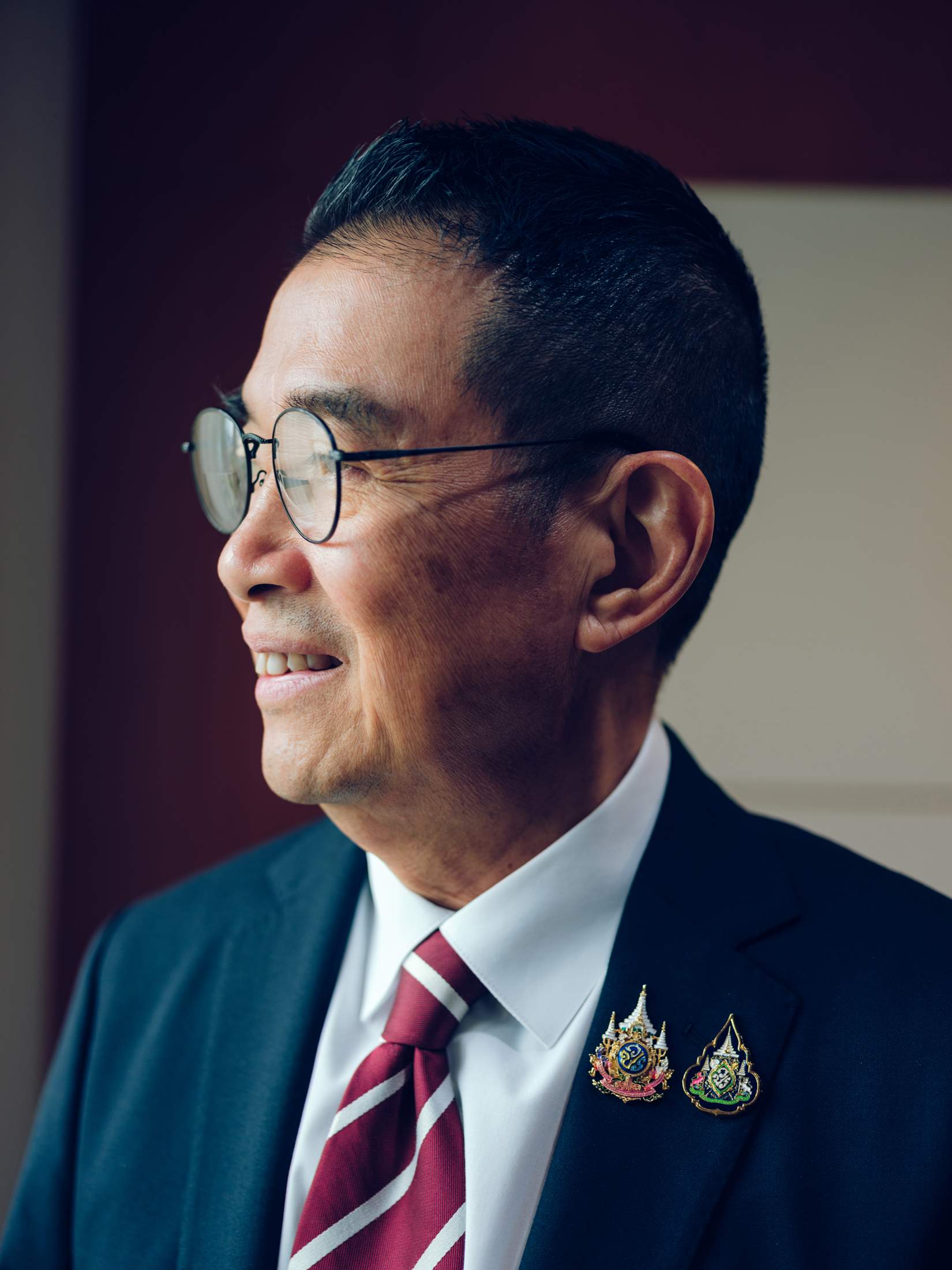
Foreign minister Sangiampongsa has spoken publicly of Thailand being “a bridge that helps create a peaceful environment” between the superpowers and he repeats this message at a closed-door bimstec meeting. “You all follow geopolitics,” he tells the room. “Many countries are looking to Thailand and our role in addressing these challenges.”
monocle meets Sangiampongsa on the top floor of the mfa. A selection of newspapers are spread out on a table and a treadmill sits idle in the corner. A keen runner, he had intended to run 10km a day – wishful thinking. Since being called out of semi-retirement to take the globetrotting job, his feet have barely touched the ground. US secretary of state Antony Blinken recently called to say “hey” and, a few days earlier, Sangiampongsa travelled to Beijing at the invitation of Wang. According to the minister, Bangkok’s bridging role between the superpowers could extend to an ever-growing list of inter-governmental groupings and exclusive groups, such as the oecd and Brics. Thai diplomats feel at home in multilateral arenas and the country’s geographical location – such an important part of its success to date – represents a physical connection between the strategically important Indian and Pacific oceans.
Thailand’s approach to international affairs is famously flexible. Territory, rights, names and principles have all been sacrificed in the name of Thai sovereignty – a rare distinction in the region. “During colonial times, Siam’s supreme objective was independence,” says Pisanu Suvanajata, Thailand’s ambassador to the UK from 2016 until 2022. “We had flexibility in our diplomacy to achieve that goal.” Peak contortionism happened in the middle of the 20th century, when Bangkok inked a treaty with the invading Japanese during the Second World War before adroitly emerging on the winning side under the patronage of the US and becoming one of Washington’s staunchest allies (a client state, say some) during anti-communist wars in Korea and Vietnam. This act of bending and adapting to the prevailing winds came to be known as bamboo diplomacy, though few practitioners believe that it accurately reflects events this century. By the end of the Cold War, when the US had pulled out its troops, Thailand had made peace with its neighbours and was pursuing an independent, friends-with-everyone foreign policy.
When it comes to Thai diplomacy, most attention is fixed on Bangkok’s ability to balance US security with Chinese trade, and less on its other strategy to seek strength in numbers (or strength in diversity, as the Thais put it). The formation of the Association of Southeast Asian Nations (Asean) is considered a high point for Thai diplomacy. Signed in Bangkok in 1967, it was Thailand’s former foreign minister, Thanat Khoman, who jetted between Indonesia, Malaysia, the Philippines and Singapore to convince these nations to make peace. The subsequent admittance of Vietnam, Laos and Cambodia, as part of a broader Thai initiative to turn battlefields into marketplaces, transformed a loose, anti-communist league into a vast free-trade zone and made Thailand less beholden to either superpower. After bimstec in 1997, Thailand founded the Asia Co-operation Dialogue in 2002 – a continent-wide gabfest that returns to Bangkok next year.
Elephant diplomacy could be a more fitting term for modern times. These clever, gregarious and benign creatures herd in large family groups, have no natural enemies and are known to socialise across species. (The Thai monarchy has also been known to gift elephants to other countries.) Suvanajata has a more fluid perspective. “Thai diplomacy has changed,” he says. “It’s no longer bending with the wind; we are like water that can penetrate into anything or anywhere we want.”
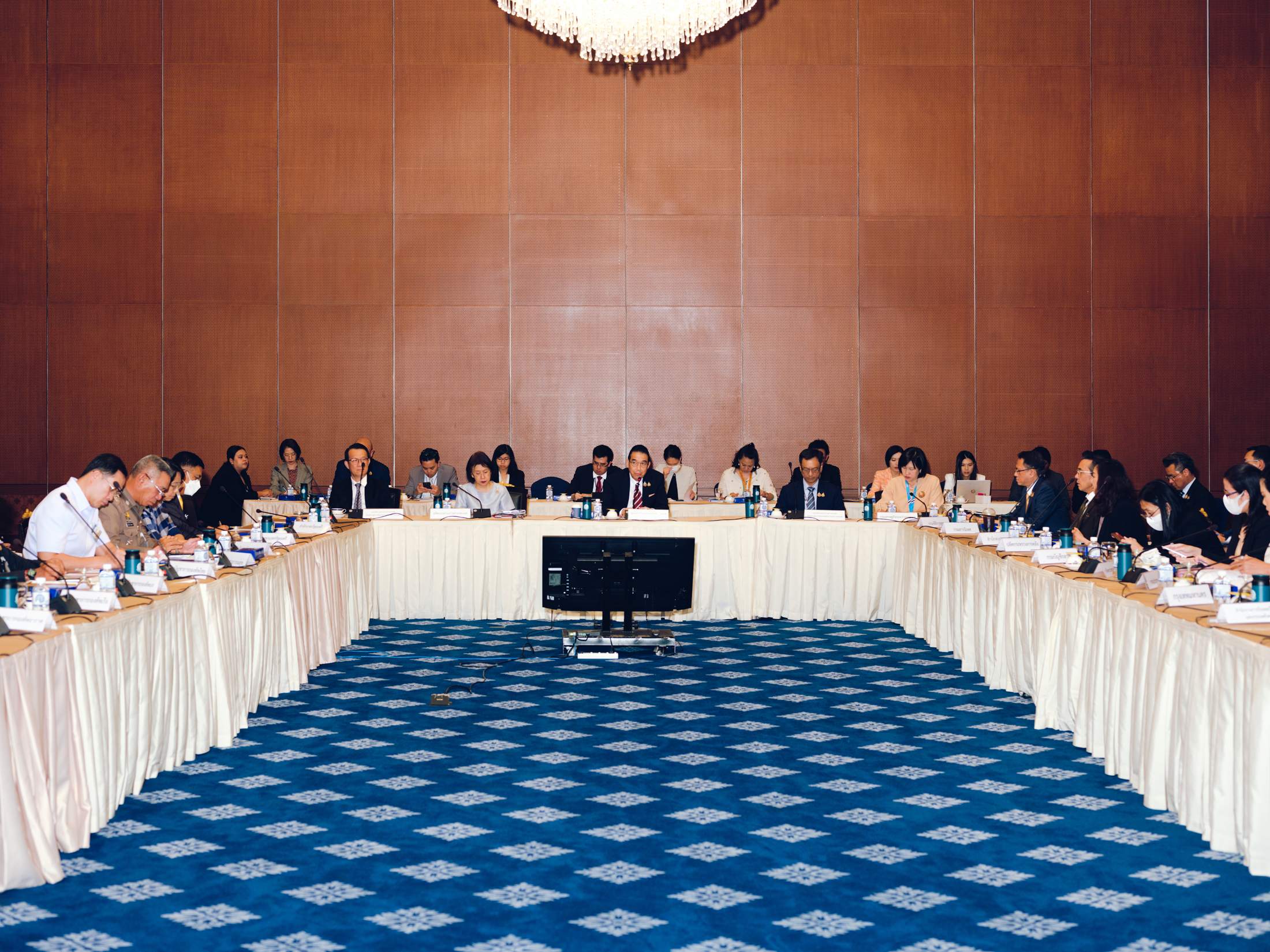
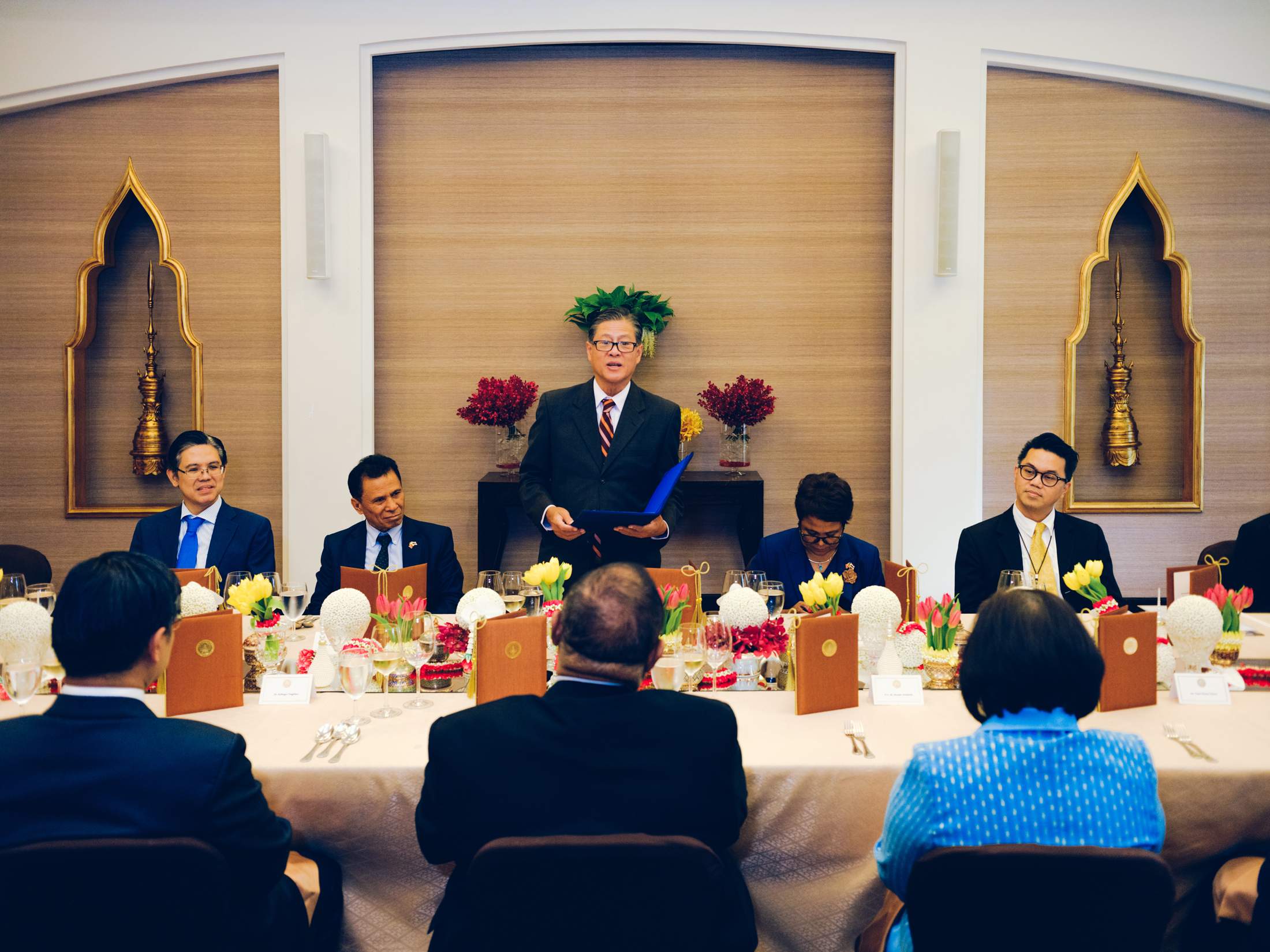
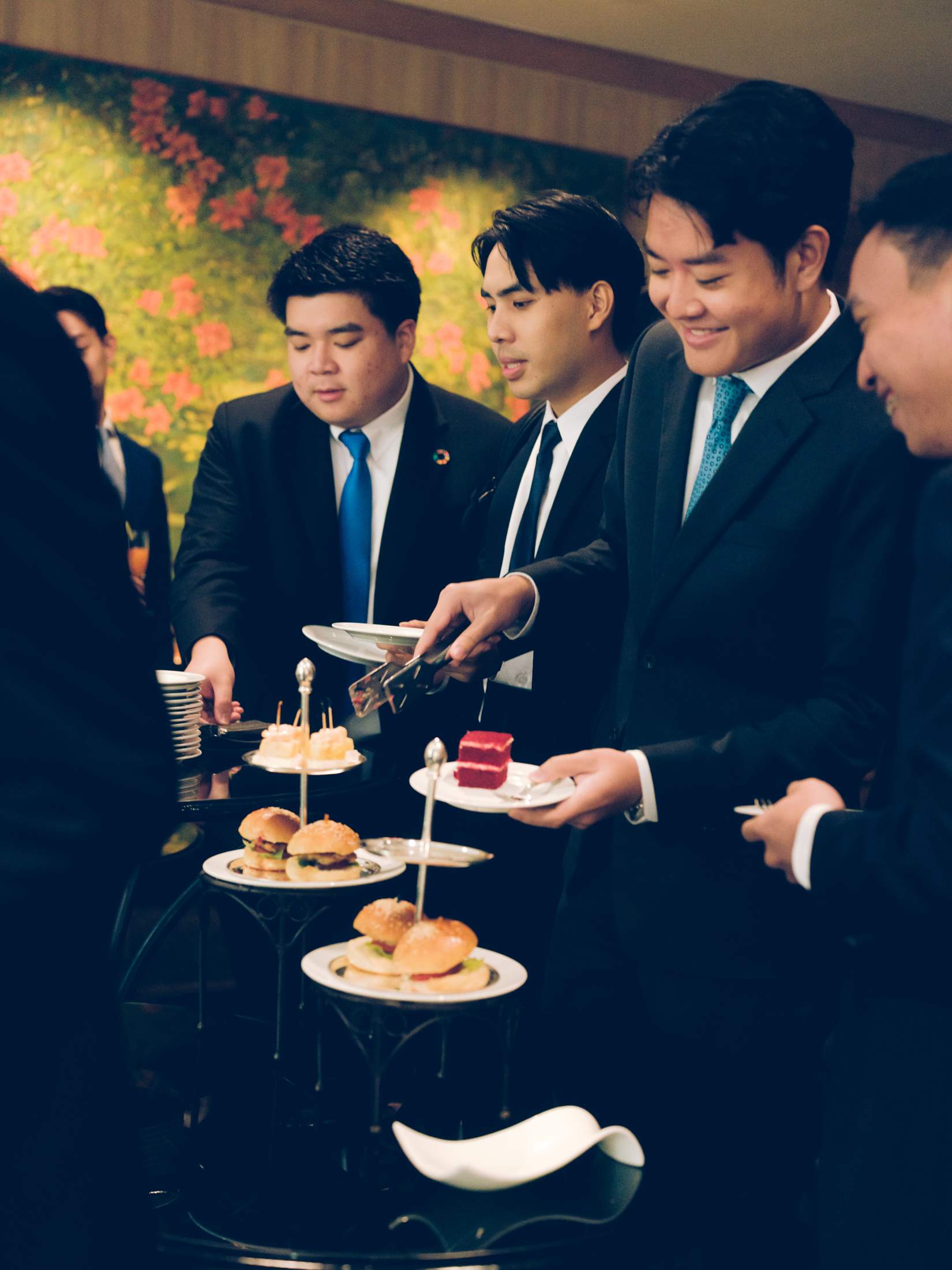
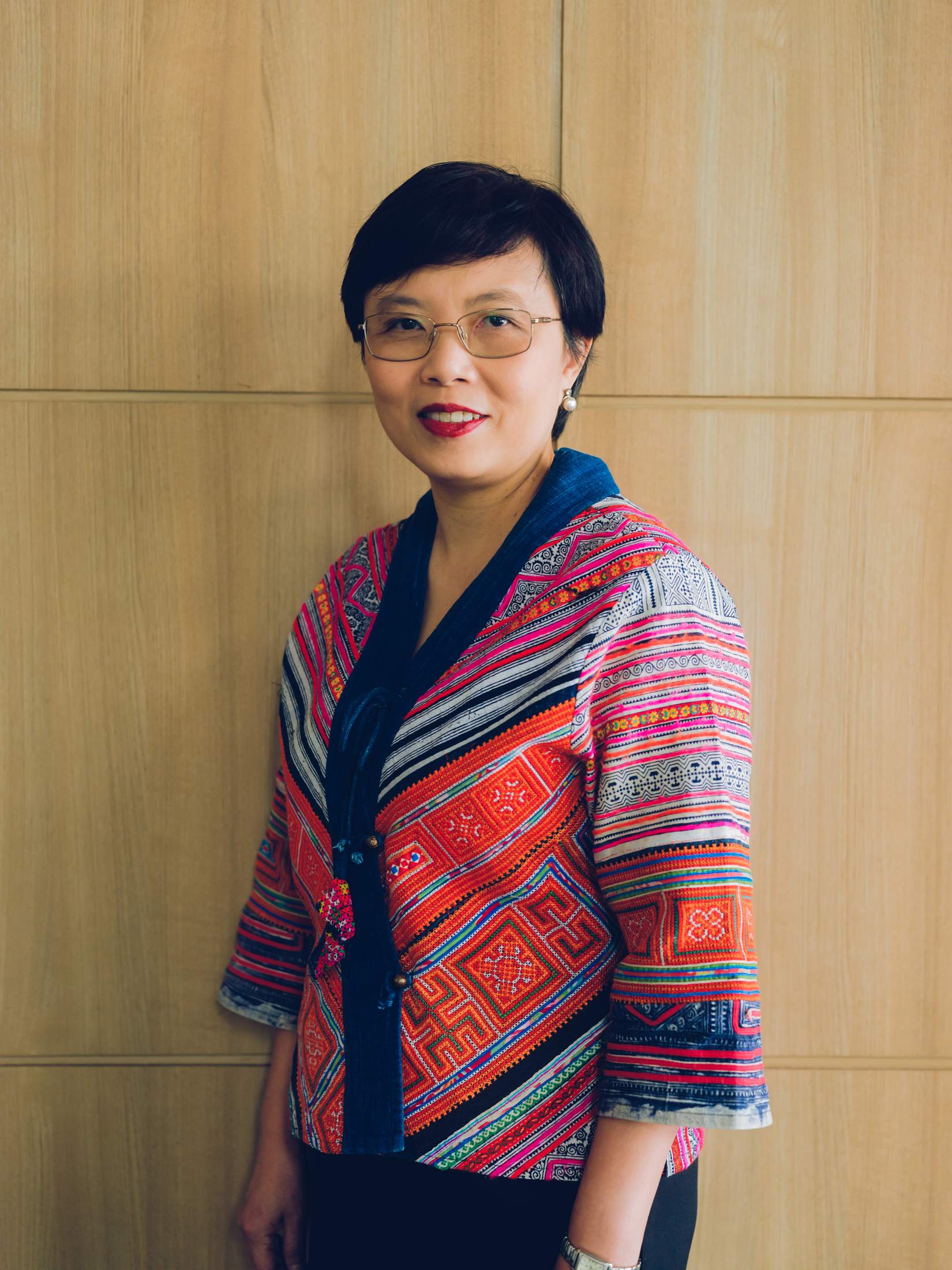
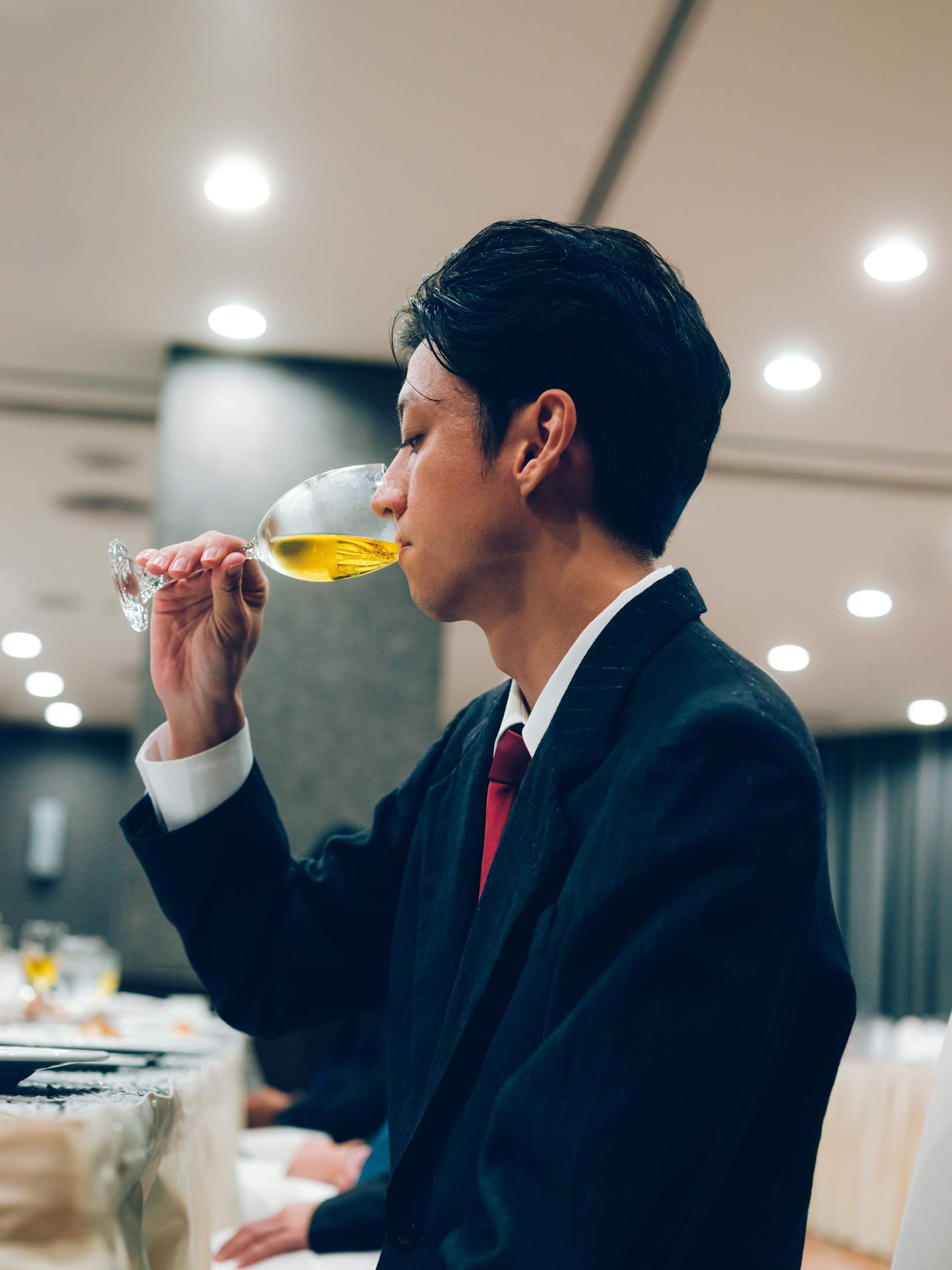
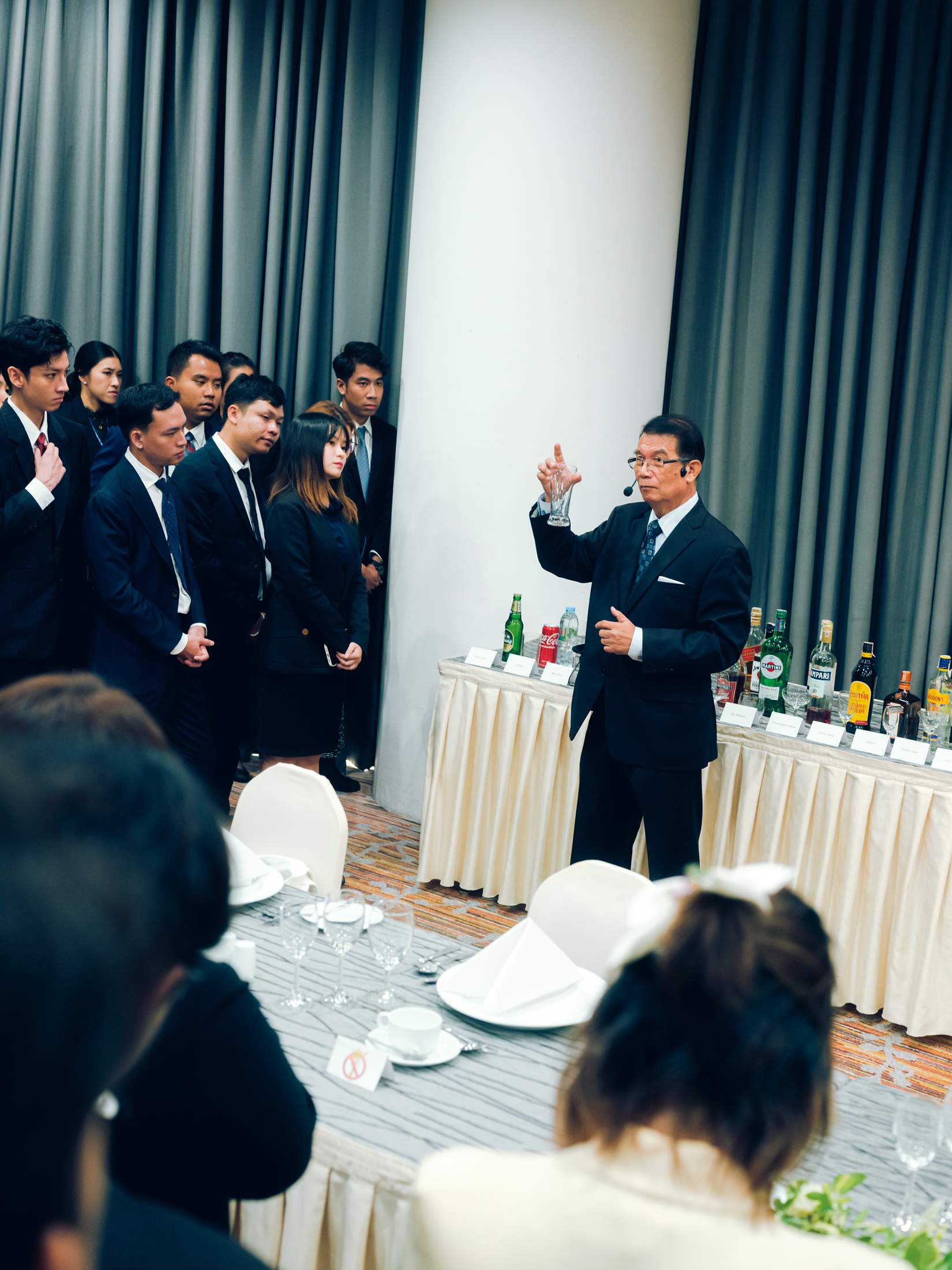
Two recent examples of Thai diplomacy have stirred plenty of academic debate. At Switzerland’s first Ukraine peace summit in June, Thailand sent a high-level representative but ultimately declined to sign the final communiqué. Some applauded Bangkok for turning up (something that it might not have done under the military government) and contributing to a discussion on food security (a topic it knows something about). Analyst Tita Sanglee saw these confusing signals as evidence of a third way between passive and proactive. Thailand wants to be an active participant in resolving issues without being forced to take sides; a Switzerland of Asia. Many others, meanwhile, deplored the fence-sitting and chronic fear of causing offence.
A second, equally perplexing strategy will play out over the next few months and years. Officials at the mfa have been instructed to apply to join the oecd and Brics, two very different clubs – one a Western-dominated group of rich countries and the other an increasingly anti-Western alternative. From the Thai perspective, joining these two multilateral organisations will provide a boost to trade and investment, and raise the country’s international stature – the government’s top two foreign-policy objectives.
It’s almost certainly a political decision, and foreign correspondents are not the only ones scratching their heads. Strong criticism is coming from inside the tent. Kasit Piromya, a former Thai foreign minister and career diplomat, calls the attempt to join Brics “idiotic” and “an absurdity”. A former ambassador to the US and Russia, Piromya came of age during the Cold War when young diplomats fighting the communists knew where they stood. “Brics is an institution that wants to have conflict and confrontation with the G7 and yet we are a partner with all seven of them,” he tells monocle from his home in Bangkok.
Former ambassador Kobsak Chutikul, another foreign-affairs grandee, sees the decision to join the oecd and Brics as a reaction to the fracturing of Asean caused by Myanmar’s civil war and the failure to deal with the multi-polar world. “Individual Asean countries are choosing their own path – stay neutral, go with China, or go with the West,” he says. “The intuitive reaction of the Thais is to hedge our bets and join everybody.” Both men share the same frustration with Thailand’s pragmatic, case-by-case approach to global events. At a time when the geopolitical winds are blowing in every direction, they would like to see Thailand’s foreign-policy brains come up with a genuine strategy for navigating superpower competition. Under the previous government, the mfa created a 20-year “five Ss” masterplan (security, sustainability, standard, status and synergy) but it reads like a marketing deck and no serving diplomat brings it up during hours of discussion. But publishing a US-style foreign-policy white paper is just not in the Thai tradition, as they know full well. Chutikul describes the foreign ministry’s flexible dna as “don’t take a position if you don’t have to, don’t say much, prefer quiet diplomacy”.
A book about Tej Bunnag, another former diplomat, published in 2021, comes closest to a contemporary account in print. The paperback, which goes through Bunnag’s experience of Thailand’s intuitive diplomacy in a conversational question-and-answer format, is handed to new recruits to the foreign service. A largely historical account and a quick read, big questions about the future go unanswered. Chief among them, Thailand’s response to an actual superpower conflict. Regional security analyst Zawacki wonders whether the question is even being asked inside the mfa. “Being friends with everyone is the right policy to have until something kicks off but you had better have a back-up plan for when things get hot,” Zawacki, author of Thailand: Shifting Ground Between the US and a Rising China, tells monocle. “If you haven’t got a plan in place when that time comes, and you haven’t already sent overtures to the relevant country, a choice will be made for you.”
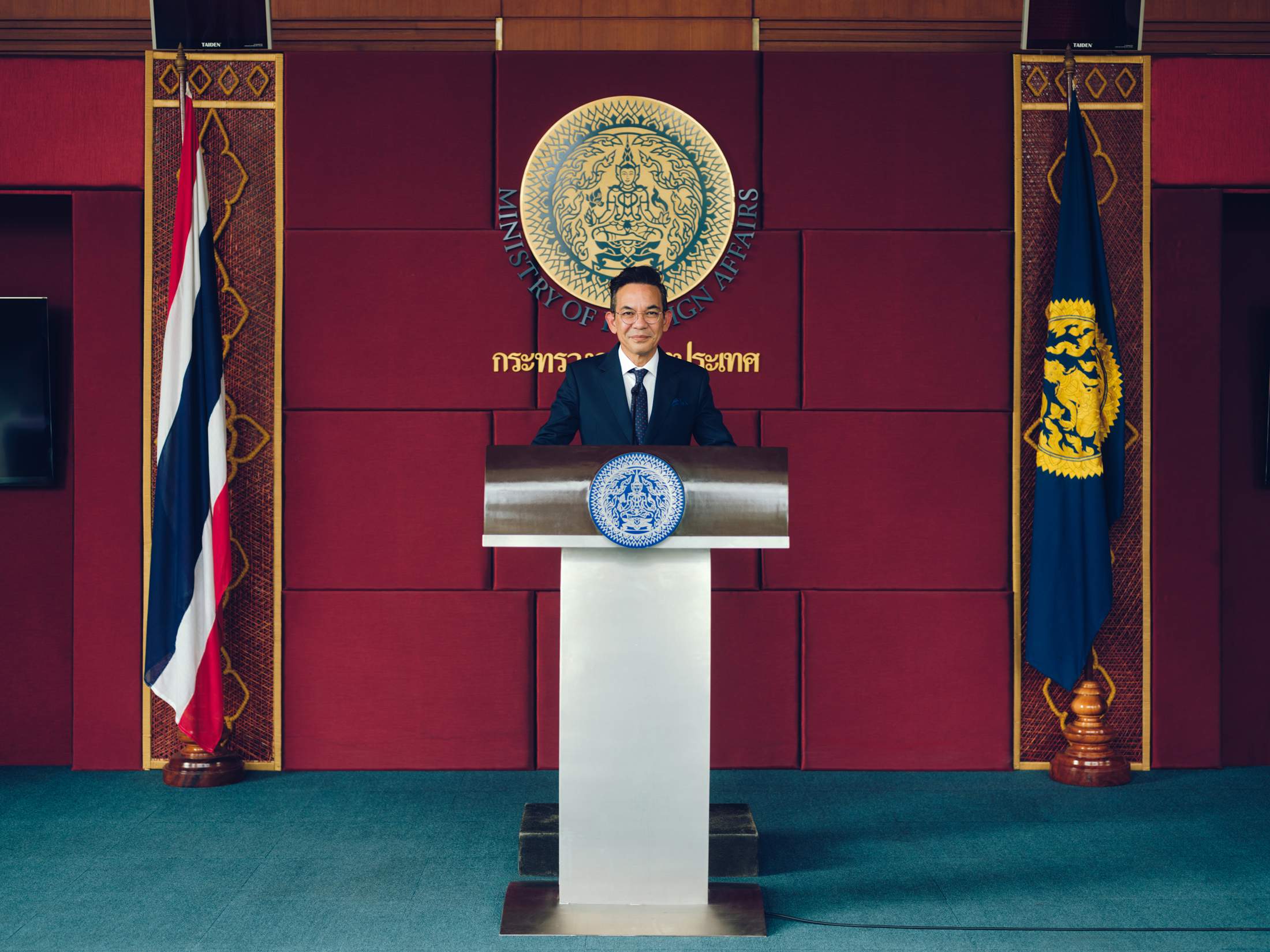
Journalists covering foreign affairs will often refer to the mfa by its former home, Saranrom Palace – a nod to when Thailand’s international relations were handled by the royal family. Devawongse Varoprakar, a worldly prince who is considered the father of Thai diplomacy, modernised the ministry in the late 19th century along Western lines, securing a standalone address across the road from the Grand Palace. The mfa moved to a purpose-built complex in the Ratchathewi district in the 1990s. Other than the Varoprakar statue standing guard at the official entrance and a replica gilded throne outside the ceremonial hall, there’s remarkably little majesty and regalia on display. Saranrom Palace’s top emissaries these days are professional civil servants rather than princes, and the permanent secretary of the mfa is considered Thailand’s highest-ranking diplomatic officer. Eksiri Pintaruchi took over the role in January, 30 years after the Georgetown University graduate entered the foreign service. “We need to ensure that our advice and concerns are taken into account at the policy level so that politicians can make an informed decision,” she says, describing her new role as a link between the ministry and the government. “Whether they listen or not is up to them.”
Pintaruchi’s first few months in office were dominated by the Department of South Asian, Middle East and African Affairs, one of 12 departments that report to her. Thai agricultural workers in Israel were the largest foreign nationality taken hostage by Hamas on 7 October 2023 and a handful have yet to be released. Closer to home, China’s territorial standoff with the Philippines in the South China Sea has caused much hand-wringing among her Asean counterparts. “We face challenging times, and these conflicts, confrontations and uncertainties affect not only economic growth but peace and stability across the globe,” she says. The most dangerous times in her career? Pintaruchi nods. Her mild manner and natural restraint make her informed views on world affairs all the more striking. “The world has become more fragmented and divided,” she says. “For countries like us to survive, we need to join hands with countries with similar concerns to make sure that the rule of law and rules-based international systems stand firm.”
Pintaruchi must achieve all of this with a meagre thb8.8bn (€230m) annual budget and a remarkably small team for a country with more than 60 million people and a top-30 economy. Thailand employs some 1,500 diplomats and diplomatic staff, split between headquarters and 98 (soon to be 99) overseas missions. As the foreign minister admits, such limited manpower leaves little time for the type of “outside the box” thinking that today’s complex geopolitical situation requires.
On the day that Pintaruchi meets monocle, she has spent her morning on management duties, screening candidates for promotion to first secretary. The foreign service has an elite reputation, and many of its high-fliers were educated at top universities in the US, UK, Australia, Japan or India. The ministry has been actively recruiting graduates from outside political science but architects seeking a change of career must still pass a rigorous entry examination that’s separate to the regular civil-servant test. Out of 3,000 applicants for this year’s intake, just 51 made it on to the two-month training course (see box) – a record high in recent years.
Thailand’s training academy for diplomats, the lofty-sounding Devawongse Varopakarn Institute of Foreign Affairs (dvifa), occupies a far less grand corner of a huge government complex in northern Bangkok. dvifa covers a diplomat’s entire career, from entry exams to retirement planning on return to civilian life.
During monocle’s visit, a group of 16 mid-level envoys, known in the trade as minister- counsellors, are receiving their final classroom- based instructions before being posted to Japan, China, Germany and Australia, among other places, where some will become deputy heads of mission. Guest speaker Pisan Manawapat, a former ambassador to the US, has been invited to give a lecture on deglobalisation. “We have always been able to chart our own course,” says Manawapat, flipping through a presentation entitled, ‘The World in Crisis’. “We are not a small country,” he says. “Politicians only say that because it fits into the narrative that we want to be neutral and friends with everyone. I don’t want to see our diplomacy conducted in that way.”
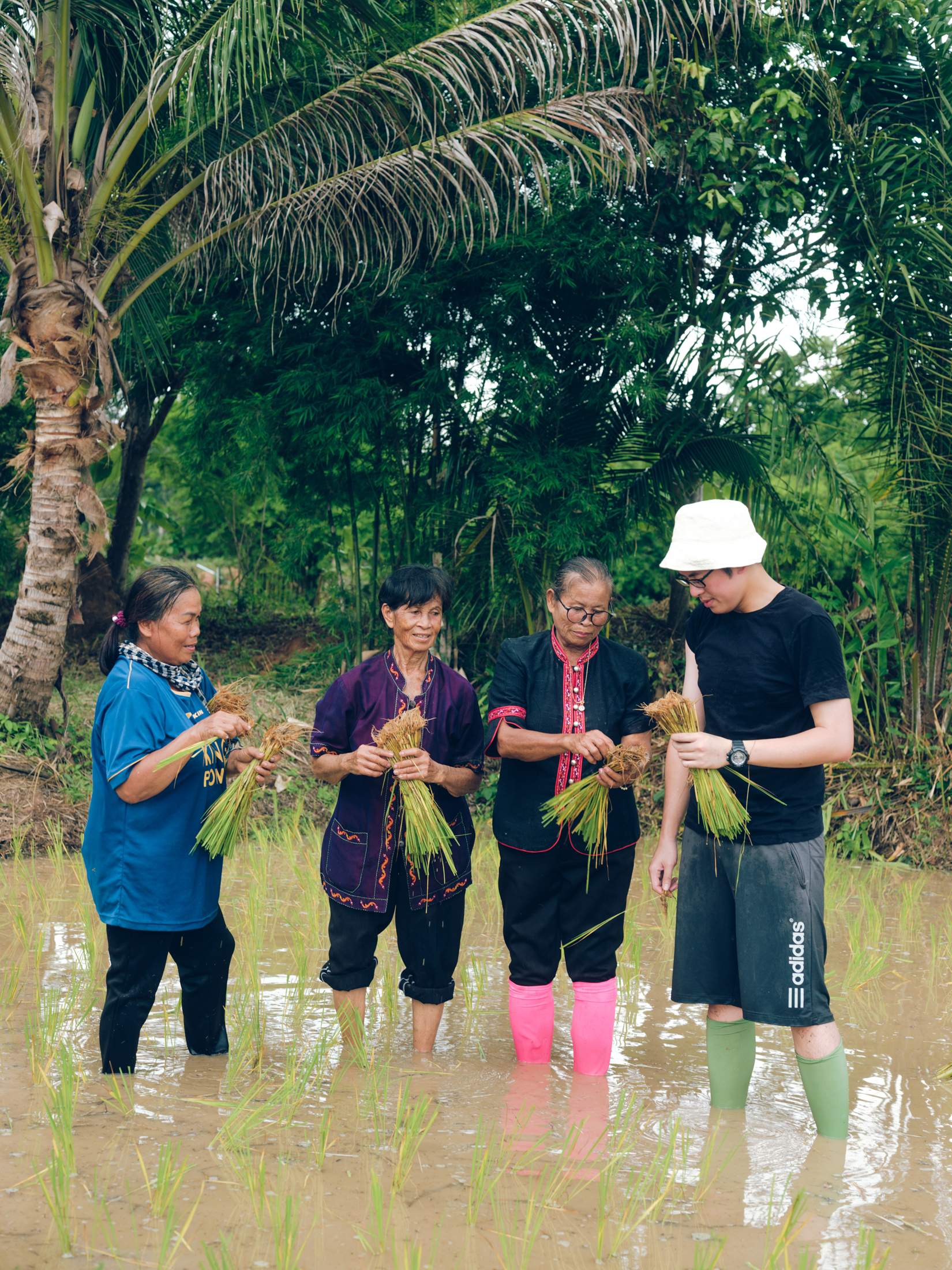
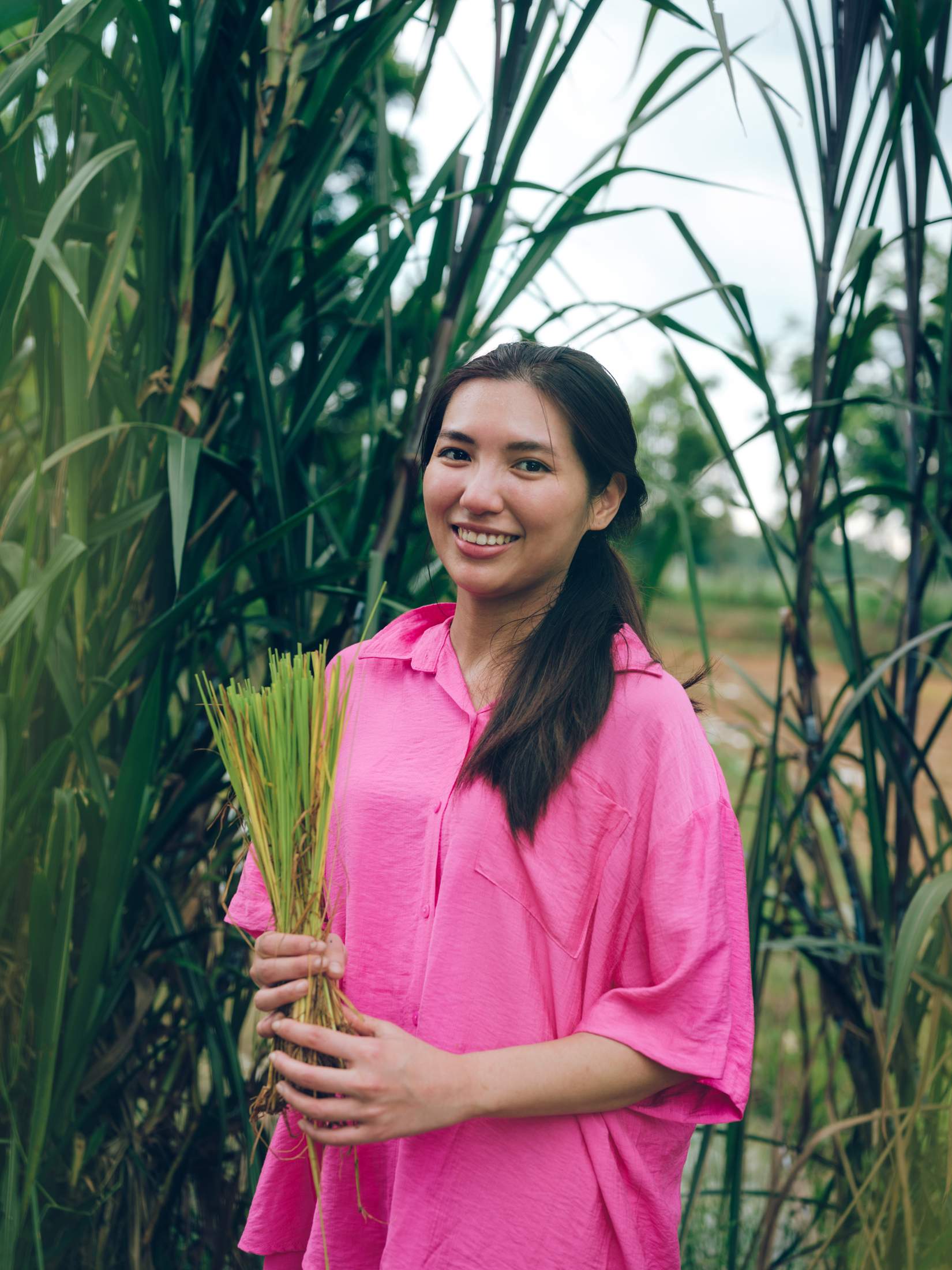
Manawapat was Thailand’s man in Washington when Donald Trump took over from Barack Obama. His 90-minute treatise on international relations includes anecdotes about bypassing the Trump-era State Department and a few digs at Western double standards over human rights in India and democracy in Vietnam. The seasoned diplomat urges his classroom to read the news voraciously and analyse it in a global context, so that they can influence media coverage and be part of the 10 or 20 per cent of diplomats who send useful cables back to Bangkok. “Make the connection beyond the country you are posted to,” he says, sharing why he thinks the application to join Brics could be in Thailand’s national interests.
Before the class of future ambassadors breaks for coffee and a session on embassy accounting, Manawapat ends his rallying cry with a reminder of Thailand’s proud history and a few housekeeping tips, mostly flag-related (bigger is better; always keep a dozen or so spares in the store cupboard). “Ask yourselves what you want to accomplish and always leave the embassy in a better shape than when you arrived,” he says. Setting clear objectives that can be flexibly obtained: Thailand’s diplomatic mantra for the ages. —
Out in the field
When Thitiporn Chirasawadi, the permanent secretary to the director of the Devawongse Varopakarn Institute of Foreign Affairs, entered the service in the 1990s, young diplomats, male and female, were shown how to eat escargot and taught that gentlemen should carry seven handkerchiefs. Now young attachés are now taught how to write diplomatic cables and spot a honeytrap. They also study outside Bangkok to learn about the “real” country they will represent. “One of our main responsibilities is to service and help Thai people across the world,” says Pintaruch.
monocle joined trainee diplomats on a field trip to Isan, a rice-growing region. Agriculture accounts for a big chunk of Thai exports and is responsible for about a third of all jobs. Thanadon Tantivit, a 23-year-old attaché from Phuket, had never been to Isan before. He decided to join the foreign service while studying at Edinburgh University and is now a desk officer in the department of European Affairs. For Tantivit, meeting farmers and learning about irrigation will provide useful grounding and perspective for future UN debates on food security and climate change.


